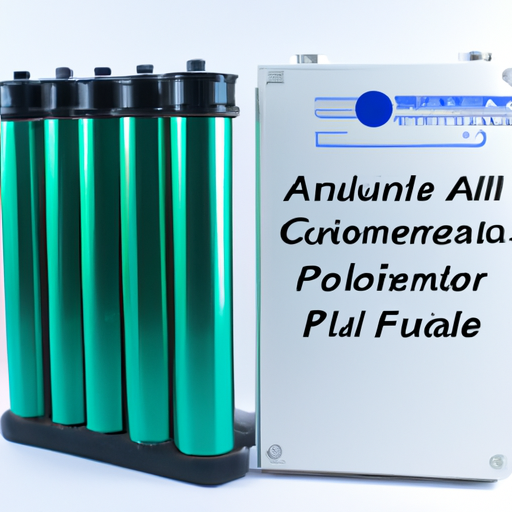Title: Product Standards for Alkaline Fuel Cells: Ensuring Efficiency and Reliability

1. Efficiency Standards (200 words) Efficiency is a critical factor in evaluating the performance of AFCs. Product standards for AFCs should define efficiency metrics, such as power density, energy conversion efficiency, and specific energy, to ensure consistent and reliable performance across different manufacturers. These standards help consumers make informed decisions and encourage manufacturers to improve their products' efficiency.
2. Safety Standards (200 words) Safety is paramount when dealing with any energy conversion technology. Product standards for AFCs should address safety concerns, including the prevention of leaks, fire hazards, and the safe handling of reactants. These standards should also outline protocols for testing and certification, ensuring that AFCs meet stringent safety requirements before entering the market.
3. Durability and Reliability Standards (200 words) Durability and reliability are crucial for the long-term viability of AFCs. Product standards should establish guidelines for testing the durability of AFC components, such as electrodes, electrolytes, and catalysts, under various operating conditions. These standards should also define performance degradation limits, ensuring that AFCs maintain their efficiency and reliability over their expected lifespan.
4. Interoperability Standards (200 words) Interoperability is essential for the widespread adoption of AFCs. Product standards should promote compatibility and standardization of AFC components, such as fuel cell stacks, connectors, and control systems. These standards enable seamless integration of AFCs into various applications, such as portable devices, vehicles, and stationary power systems, fostering market growth and reducing costs.
5. Environmental Standards (200 words) As a clean energy technology, AFCs should adhere to environmental standards. Product standards should address the environmental impact of AFCs throughout their lifecycle, including the sourcing of raw materials, manufacturing processes, and end-of-life disposal. These standards should encourage the use of sustainable materials, energy-efficient manufacturing techniques, and recycling practices, minimizing the environmental footprint of AFCs.
Conclusion (100 words) Product standards play a crucial role in ensuring the efficiency, reliability, and safety of alkaline fuel cells (AFCs). By establishing comprehensive standards, AFC manufacturers can deliver high-quality products that meet consumer expectations and regulatory requirements. These standards also promote interoperability, market growth, and environmental sustainability. As AFC technology continues to evolve, it is essential to regularly update and refine these standards to keep pace with advancements and address emerging challenges. By doing so, we can unlock the full potential of AFCs as a clean and efficient energy solution for various applications.
Title: Product Standards for Alkaline Fuel Cells: Ensuring Efficiency and Reliability

1. Efficiency Standards (200 words) Efficiency is a critical factor in evaluating the performance of AFCs. Product standards for AFCs should define efficiency metrics, such as power density, energy conversion efficiency, and specific energy, to ensure consistent and reliable performance across different manufacturers. These standards help consumers make informed decisions and encourage manufacturers to improve their products' efficiency.
2. Safety Standards (200 words) Safety is paramount when dealing with any energy conversion technology. Product standards for AFCs should address safety concerns, including the prevention of leaks, fire hazards, and the safe handling of reactants. These standards should also outline protocols for testing and certification, ensuring that AFCs meet stringent safety requirements before entering the market.
3. Durability and Reliability Standards (200 words) Durability and reliability are crucial for the long-term viability of AFCs. Product standards should establish guidelines for testing the durability of AFC components, such as electrodes, electrolytes, and catalysts, under various operating conditions. These standards should also define performance degradation limits, ensuring that AFCs maintain their efficiency and reliability over their expected lifespan.
4. Interoperability Standards (200 words) Interoperability is essential for the widespread adoption of AFCs. Product standards should promote compatibility and standardization of AFC components, such as fuel cell stacks, connectors, and control systems. These standards enable seamless integration of AFCs into various applications, such as portable devices, vehicles, and stationary power systems, fostering market growth and reducing costs.
5. Environmental Standards (200 words) As a clean energy technology, AFCs should adhere to environmental standards. Product standards should address the environmental impact of AFCs throughout their lifecycle, including the sourcing of raw materials, manufacturing processes, and end-of-life disposal. These standards should encourage the use of sustainable materials, energy-efficient manufacturing techniques, and recycling practices, minimizing the environmental footprint of AFCs.
Conclusion (100 words) Product standards play a crucial role in ensuring the efficiency, reliability, and safety of alkaline fuel cells (AFCs). By establishing comprehensive standards, AFC manufacturers can deliver high-quality products that meet consumer expectations and regulatory requirements. These standards also promote interoperability, market growth, and environmental sustainability. As AFC technology continues to evolve, it is essential to regularly update and refine these standards to keep pace with advancements and address emerging challenges. By doing so, we can unlock the full potential of AFCs as a clean and efficient energy solution for various applications.